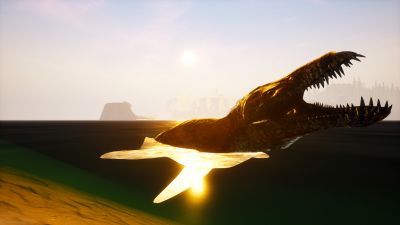Difference between revisions of "Aquatic Creatures"
Dinoman9877 (talk | contribs) (Added Kronosaurus to the list.) |
|||
| Line 2: | Line 2: | ||
* [[Mosasaurus]] | * [[Mosasaurus]] | ||
| − | |||
| − | |||
| − | |||
* [[Elasmosaurus]] | * [[Elasmosaurus]] | ||
| + | * [[Kronosaurus]] | ||
| − | [[File: | + | [[File:719890 screenshots 20180921163750 1.jpg|right|thumb|400px|border|Kronosaurus]] |
| − | |||
| − | |||
Maps are frequently designed with these creatures in mind. Many [[Freshwater Lakes|lakes]] contain [[Dungeons|caves]] that link to larger bodies of water where aquatic creatures often [[Spawning System|spawn]]. The maps often have areas that are exposed to flooding via [[Tidal System|tides]] such that areas that may be easy to traverse for [[Terrestrial Creatures|terrestrial]] creatures during low tide may be very dangerous during high tide. [[Weather|Storm surges]] also provide a significant boon for aquatic creatures to reach areas they normally could not. | Maps are frequently designed with these creatures in mind. Many [[Freshwater Lakes|lakes]] contain [[Dungeons|caves]] that link to larger bodies of water where aquatic creatures often [[Spawning System|spawn]]. The maps often have areas that are exposed to flooding via [[Tidal System|tides]] such that areas that may be easy to traverse for [[Terrestrial Creatures|terrestrial]] creatures during low tide may be very dangerous during high tide. [[Weather|Storm surges]] also provide a significant boon for aquatic creatures to reach areas they normally could not. | ||
Revision as of 13:23, 7 October 2018
Beasts of Bermuda contains playable creatures that exist in aquatic environments, usually the ocean. These creatures are very swift in the ocean, but completely inept on land. Currently the game has two playable aquatic creatures.
Maps are frequently designed with these creatures in mind. Many lakes contain caves that link to larger bodies of water where aquatic creatures often spawn. The maps often have areas that are exposed to flooding via tides such that areas that may be easy to traverse for terrestrial creatures during low tide may be very dangerous during high tide. Storm surges also provide a significant boon for aquatic creatures to reach areas they normally could not.
Aquatic creatures have significantly beneficial weather resistance stats, making them nearly immune to the negative effects of storms.
Aquatic creatures do not need to drink, but they do need to occasionally breathe in order to survive. One must occasionally surface in order to refill their air, shown in place of thirst in our current, soon to be legacy UI. Air, or lack thereof, has identical influence on aquatic creatures that thirst and hydration have on non aquatic creatures.
- Frequently surfacing for air will improve the rate at which a creature recovers lost HP. A state of very low oxygen can cause a creature's HP to decay over time rather than heal.
- Keeping your oxygen high increases the rate at which a player's stamina recharges by 15%, whereas being low on breath will cause a player's stamina to recharge 15% slower.
- Keeping your oxygen high increases the rate at which a player's ability power recharges by 15%, whereas being low on breath will cause a player's ability power to recharge 15% slower.
- A creature with a fresh breath of air will more rapidly heal from injuries.
Aquatic creatures frequently have grabs to drag their prey into the water. Doing so, however, drains lots of air.
Aquatic creatures do not use the breath mechanic to represent holding ones breath. Instead, they have air.
The Ichthyovenator will be semiaquatic, harboring traits from both aquatic and terrestrail creatures.
